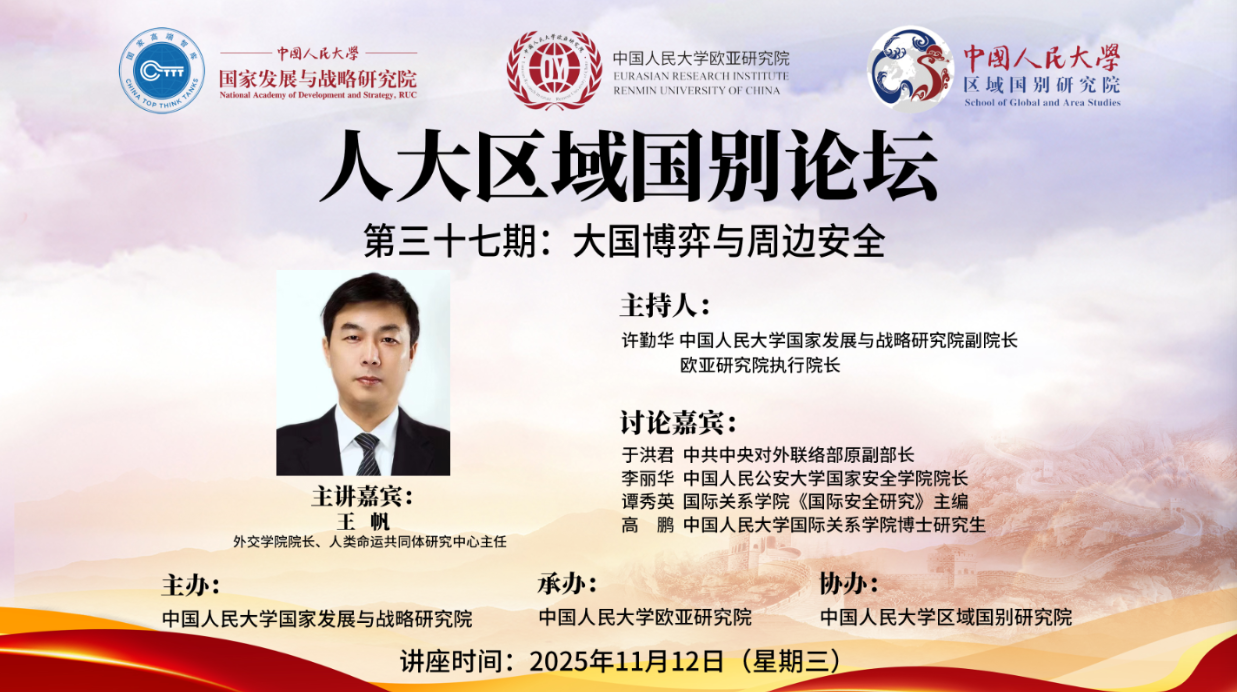智库中外对话丨Darren Smith:中国式现代化为全球现代化进程贡献了中国方案
发布时间:2025-11-19对中国式现代化和“十五五”规划的理解
Understanding of Chinese Modernization and the 15th Five-Year Plan

Professor Darren Smith
Darren Smith is a professor of Geography at Loughborough University in the UK, a Fellow of the British Academy of Social Sciences(FAcSS), an adjunct professor at Hunan University, China; A high-level foreign expert introduced by the Chinese State Administration of Foreign Experts Affairs. He currently serves as the Chair of Commission on Population Geography at International Geographical Union (IGU), and as the Editor-in-Chief (co-) of Population, Space and Place, Wiley (SSCI Q1) and Journal of Rural Studies, Elsevier (SSCI Q1).
Darren Smith是英国拉夫堡大学教授、英国社会科学院院士,湖南大学兼职教授;中国国家外专局高端引进人才。目前,担任国际地理学会人口地理专业委员会主席,国际期刊《Population, Space and Place》(SSCI Q1)《Journal of Rural Studies》(SSCI Q1)主编。
In your view, what is the core essence of "Chinese Modernization"? How does it primarily differ from Western models of modernization?
在您看来,“中国式现代化” 的核心 内涵是什么? 它与西 方现代化模式 有何主要区别?
As a population geographer, my immediate thought is that China, with its population of over 1.4 billion, is undergoing a modernization process on an unprecedented scale in human history. Enabling such a massive population to achieve a moderately prosperous life, universal basic education, and establish essential healthcare protection—all while improving living standards under resource constraints—and simultaneously advancing the coordinated development of industrialization, informatization, digitalization, and green initiatives, involves exponentially growing complexity and challenges. The Chinese government has implemented a series of public policies, making substantial investments in basic public services, education, and public health. Through technological innovation and institutional optimization, absolute poverty has been eradicated, the number of higher-educated individuals has expanded, the urbanization of rural populations has accelerated, and life expectancy has increased. These achievements have laid a critical intellectual foundation and provided an ample labor force for Chinese-style modernization, while also making significant contributions to global population sustainability. By constructing a governance system tailored to the modernization of a massive population, China has integrated population development with policies on education, employment, elderly care, and housing. Through the equalization of basic public services, it has narrowed regional, urban-rural, and group disparities, achieving win-win development in the context of an ultra-large population. The modernization of China's massive population holds positive significance, demonstrating that an ultra-large population can serve as a vital driver of economic development. Chinese-style modernization is not an imitation of the West but an innovative practice rooted in China's national conditions. With a people-centered approach, it balances the inclusivity and sustainability of population modernization, reflecting unique value orientations and governance wisdom, and contributing Chinese solutions to the global modernization process.
作为人口地理学家,我首先想到的是中国有14亿多人口,需要经历一个人口规模巨大的现代化过程,这在人类历史上也是前所未有的。让这个体量的人口实现小康生活、普及基础教育、建立基本医疗保障,在资源约束背景下实现了保障和改善民生,且同步推进工业化、信息化、数字化、绿色化协同发展,其复杂性和难度是指数级增长。中国政府推行一系列公共政策,在基本公共服务、教育和公共卫生领域的巨大投入,通过技术创新、制度优化等方式,消除了绝对贫困、扩大了高等教育人口、提高了农村人口市民化水平、提升了人均预期寿命,为中国式现代化提供了至关重要的智力基础和高素质高技能人口,也为全球人口可持续发展,做出了巨大贡献。以超大规模人口现代化构建治理体系,将人口发展与教育、就业、养老、住房等政策系统集成,通过基本公共服务均等化缩小区域、城乡、群体差距,在超大规模人口背景下实现共赢发展。中国超大规模人口现代化具有积极意义,表明超大规模人口可成为经济发展的重要动力。中国式现代化不是对西方的模仿,而是基于中国国情的创新实践,特别是以人民为中心,兼顾人口现代化的普惠性与可持续性,它体现了独特的价值取向和治理智慧,为全球现代化进程贡献了中国方案。
How do you believe the international community, including Western nations, should objectively perceive and respond to the rise of Chinese Modernization? What are the main cooperative opportunities and potential challenges that need addressing?
您认为国际社会包括西方国家 应如何客观 看待 并回应中国式 现代化? 其中存在哪些主要 的 合作 机遇与 需要应对的挑战?
I believe the international community, particularly Western countries, should view China's modernization process through a more rational and objective lens. In my view, Chinese modernization presents tremendous opportunities for global cooperation, representing an expansion of new paradigms in humanity's modernization journey. It essentially injects new momentum into global development, rather than constituting a so-called "challenge." Achievements in areas such as housing security, public service provision, employment expansion, and the enhancement of well-being serve as vivid examples of high-quality demographic development globally. China's ultra-large market of 1.4 billion people provides stable demand and a source of high-quality goods for the world, creating cooperation opportunities for enterprises globally and for developing countries. Simultaneously, consumption upgrading "will vigorously propel sustained development of the world economy" and offer a stable market for global businesses. On the governance front, the experience China has accumulated in managing its ultra-large population—in urban-rural governance, poverty alleviation, and the equalization of basic public services—provides valuable references for developing countries addressing urban-rural development challenges. It also offers new perspectives for Western countries dealing with issues like aging populations and regional imbalances. For instance, China's urban-rural governance experience offers insights for countries worldwide. China has not only provided housing for its 1.4 billion people, along with supporting facilities for education, elderly care, healthcare, and transportation, but has also created diverse employment opportunities, continuously enhancing the well-being of its residents and achieving high-quality demographic development.
我认为国际社会,特别是西方国家,应当以更加理性、客观的视角来看待中国式现代化的过程。在我看来,中国式现代化为世界提供了巨大的合作机遇,是人类现代化进程的新范式拓展,本质上为全球发展注入了新动能,而非所谓 “挑战”。在住房保障、公共服务供给、就业扩容、幸福感提升等领域取得的成就,成为全球人口高质量发展的生动范例。经济上,中国拥有14亿人口的超大规模市场,为全球提供了稳定的需求和高品质的商品来源,为世界各国的企业和发展中国家带来了合作机会。同时,消费升级将有力推动世界经济持续发展,也为全球企业提供稳定市场。治理层面,中国在超大规模人口的城乡治理、脱贫攻坚、基本公共服务均等化等领域积累的经验,为发展中国家破解城乡发展难题提供了可借鉴的参考,也为西方国家应对老龄化、区域失衡等问题提供了新视角。如中国的城乡治理经验给世界各国带来参考依据,中国不仅为14亿人口提供了住房以及教育、养老、医疗、交通等配套设施,而且也带来了多样化的就业机会,不断提升了中国居民幸福感,实现人口高质量发展。
Looking ahead, what role do you foresee Chinese Modernization playing in shaping the global landscape in the next decade?
展望未来,您预见中国式 现代化将在塑造 下一个 十年的全球图景中扮演 怎样的角色?
Since the end of the pandemic, I have visited China multiple times and have been amazed by the rapid development of its digital economy and society. The government plays a crucial guiding role in the growth of the digital economy, while fully leveraging the advantages of its ultra-large market to promote the deep integration of digital technology with the economy and society. In particular, through the construction of digital infrastructure and platforms, high-quality educational, medical, and financial resources have transcended urban-rural and regional boundaries. Technology-enabled inclusivity has significantly enhanced the sense of fulfillment among the people. I believe that in the next decade, China will become a key global provider of digital infrastructure and spatial information systems, offering critical technological support for global urban planning, disaster management, and climate change response. Furthermore, in the field of emerging artificial intelligence technologies, China will serve as a major engine for the global intelligent economy. AI technology, combined with the massive data generated by economic and social activities, can provide dynamic adjustment solutions to improve the allocation efficiency of labor, capital, technology, knowledge, and other factors. This will help address regional development imbalances and facilitate a shift from uneven and inadequate development to increasingly coordinated regional progress. The AI economy will become widely across China, driving advancements in computing power and innovation in future industries. It will improve public services, create new forms of employment, promote cultural preservation and innovation, and enhance the intelligence and refinement of urban governance. Ultimately, this will reshape global production and lifestyles, positioning China as a global leader in manufacturing, information technology, energy, and other fields
疫情结束后,我多次访问中国,让我惊叹的是中国的数字经济社会发展迅速。政府在数字经济发展中发挥着重要的引导作用,同时充分利用超大规模市场优势,推动数字技术与经济社会的深度融合。特别是通过数字基础设施和平台建设,让优质教育、医疗资源、金融资源跨越城乡与区域界限,技术赋能普惠,大大提升民众获得感。我认为未来十年,中国会成为数字基础设施与空间信息体系的重要全球提供者,能够为全球城市规划、灾害管理和气候变化应对提供关键技术支撑;其次,在新兴人工智能技术方面,中国将会成为全球智能经济的重要引擎。人工智能技术可结合经济社会活动产生的海量数据,为提升劳动、资本、技术、知识等各类要素配置效率提供动态调整方案,有助于解决区域发展不平衡问题,推动发展不平衡不充分向区域日益协调发展转变。人工智能经济将在中国广泛普及,并推动算力发展和未来产业创新,改善民生服务,创新就业形态,促进文化传承与创新,提升城市治理智慧化精细化水平,从而重塑全球生产生活方式,在制造、信息、能源等领域成为全球引领。
(专家观点仅为学术探讨与交流,不代表任何官方立场或观点)
审核人:肖超伟







